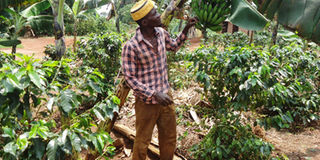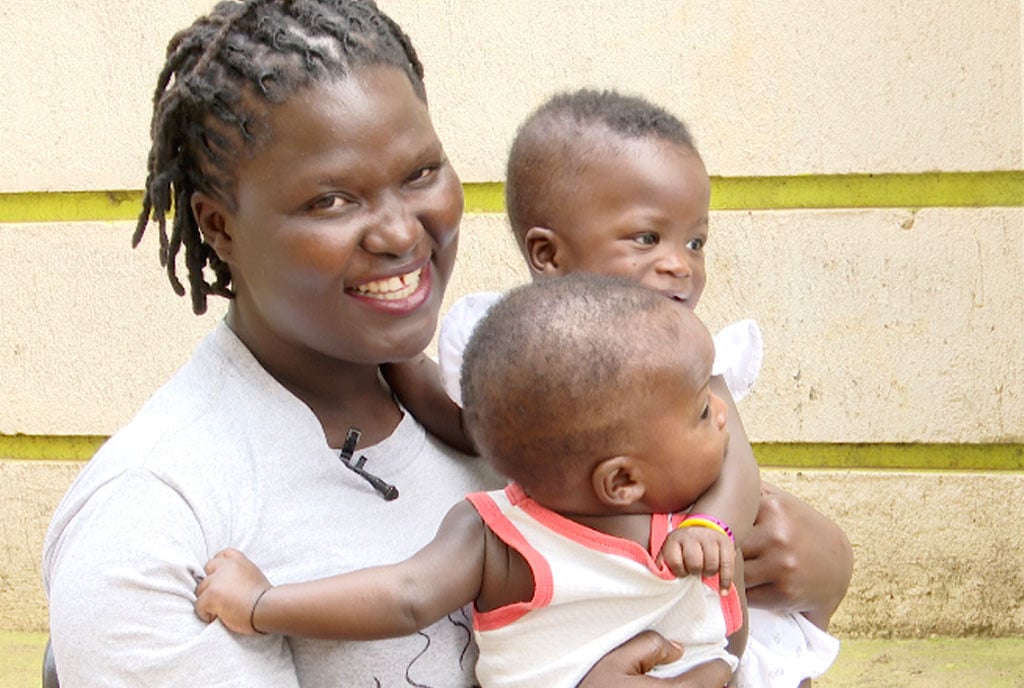Prime
He made good use of an inheritance from his father

Above and below, Wasaka in his farm checking on the banana and passion fruit and watering seedlings in the nurseries. PHOTOS BY FRED MUZAALE.
Before he went into farming, he had traded in cattle, rode a boda boda and sold gomesis. Musa Wasaka shared his story with Fred Muzaale.
I am Musa Abduljabber Wasaka, a resident of Kisombwa village in Kayunga Sub-county, Kayunga District. I have three acres of land where I grow bananas, coffee and passion fruit. There are also nurseries for the latter two crops on the same land.
Before I started farming in 2009, I was a cattle trader. I bought cattle in Uganda and sold them in South Sudan. Due to insecurity there, I abandoned the business and got into boda bodas, and later sold clothes in Kampala. These ventures were unprofitable because of the high taxes and stiff competition.
So, I decided to turn my efforts to farming. I had a piece of land in Kayunga, which I inherited from my father. Using the savings I had made, I bought 500 suckers of banana, the Mpologoma variety from Kawanda Agricultural Research Institute. I bought each sucker at Shs1,000 and I planted them on one acre. I dug a shallow trench in the middle of the garden, where I placed compost manure, and covered it with a layer of soil. It is advisable because if placed where the bananas are planted, the fertiliser may “burn” the plants. Also, the roots get nutrients away from the surrounding areas.
At one and a half years, I inter-cropped the bananas with Robusta coffee, the Nasaland variety. Unlike other coffee varieties, which have many fibrous roots that frustrate growth of other crops, Nasaland coffee has few fibrous roots. In addition, it is not susceptible to pests and diseases such as wilt and stem borer.
This variety starts flowering early, at six to seven months and the yields are high compared to the other coffee varieties. It is also easy to pick the cherries since the trees are short. The other advantage is that its branches do not dry up as it grows.
Harvest
Every month, I get at least 20 bunches of banana which I sell at Shs8,000 for a small one and Shs12,000 a big one. Most are bought by traders in Kayunga Town.
For coffee, the harvest is twice a year. The first season, April-May, I get at least 500kg of of fresh coffee. In December, the main season, it varies between 1,000kg and 1,500kg. I sell dry coffee beans at Shs2,000 each kilo. From coffee alone, I earn about Shs 3.5m a year and from banana, it is at least Shs180,000 a month.
Passion fruits
On the farm, there are 20 passion fruit plants of Kawanda hybrid. I harvest fruits every week and sell to traders in Kayunga , Mukono and Jinja. A basin of passion fruits goes for Shs7,000 when supply on the market is high. When there is scarcity, the price goes up to Shs20,000 or more.
Nursery
Using seed saved from my coffee, I set up a nursery bed. Currently, there are at least 1,000 seedlings. Each seedling is Shs500.
There is also a nursery bed for passion fruit seedlings. I cut stems from my garden and use rooting powder to stimulate root growth from the stems. This method is faster and easier than grafting. The price is Shs2,000 each.
From seedlings, I earn about Shs500,000 month during planting season this falls to Shs100,000 when there is no planting.
Training
I also train farmers on care and management of coffee , banana, passion fruit gardens. I train them from my garden but sometimes I offer trainings from their gardens. The charge is Shs15,000 when I train a farmer from his or her garden and Shs5,000 on my farm.
Challenges
Since I do not have an irrigation system, the biggest challenge is during the dry seasons when crops wither. I plan to buy a pump to get water from a nearby swamp to water my crops during such periods.
Achievements
Since I had dropped out of school because I lacked the fees, I went back to school and sat for O-Level exams last year at Nakivubo Blue Adult Education. I plan to do A-Level and then a degree in agriculture. I bought another piece of land to expand my enterprise to dairy and poultry.
Future plans
I want to diversify my income. I also plan to construct a training centre on organic farming but this will be when I complete my degree.




